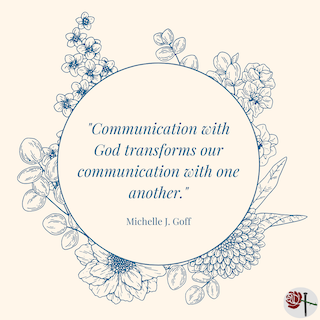 Written by Michelle J. Goff
Written by Michelle J. Goff
For relationships to work, we must work at them. Friendships develop over time and through shared experiences.
Roommates will tell you that clear communication is important. Expectations have to be expressed and explained, then either dismissed, adjusted, or met. Who is going to take out the trash? Do we share meals or do our own? Are you a morning person or a night owl?
For a season, my parents taught a premarital class on first-year adjustments. The blending of two families is not a trivial undertaking. They asked key questions and told funny anecdotes in order to walk the couple through some of the preparation that it takes to make these first-year adjustments. The answers to some questions may appear obvious to one, but the other has a very different way of looking at things. Respectful love and open communication are necessary building blocks for a solid marriage.
Forty-five years later, my parents would tell you respectful love and open communication are still key elements that cannot be ignored. I echo the sentiment of their necessity even though, for me, that has not been evidenced directly through marriage, but rather as foundational factors in the building of all relationships.
Respectful love is not eros love, the romantic type of love that can be fleeting and emotion based. Respectful love is rooted in fileo (brotherly) and agape (unconditional) love, as we find most described in the Bible. First Corinthians 13, for example, presents a love that is not self-seeking. It keeps no record of wrongs.
Love is patient and kind; love does not envy or boast; it is not arrogant or rude. It does not insist on its own way; it is not irritable or resentful; it does not rejoice at wrongdoing, but rejoices with the truth. Love bears all things, believes all things, hopes all things, endures all things.Love never ends.
I don’t know about you, but that type of love seems nearly impossible, unattainable by my own efforts. I can be admittedly selfish. I am least patient with myself, but also impatient with others. My desire to not be taken advantage of leads me to keep a record of wrongs and occasionally be resentful.
In my mind, I know that no matter the type of relationship, if I want it to develop and deepen, it must be grounded in a love that respects the other person, considers his or her needs above our own, and endures.
How do I resolve the distance between the biblical description of love as found in 1 Corinthians 13 and the fallible version of love found in most relationships?
God. Since God is love, I step back and allow Him to define the relationship. Have you thought about having a DTR talk with God? DTR: Define the Relationship.
Because the other way in which we can work toward attaining that kind of love in our relationships is through communication—with God and with the other person.
Not to sound cliché, but sincere, open communication with God through prayer will guide us in redefining our relationships. Communication with God transforms our communication with one another. A foundational relationship with God lays the groundwork for our relationships with others.
Take a moment today to reflect on two relationships you want to see grow. Pray about those two people by name. Ask God to guide your communication. Invite Him, as Love defined, into your conversations and interactions.